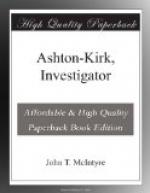“Oh, I’m so sorry to have brought you out so early and on such a dismal morning,” she said, lightly, leading him into a room at one side. “I’m sure it is very damp.”
She sat down and motioned him to a chair; he studied her with some surprise; the transition from wild terror to her present calm was most notable.
“There has been a recovery of poise, evidently,” Ashton-Kirk told himself. “She is still frightened, but for some reason is anxious to hide it.”
“This morning,” said Miss Vale, with a laugh that rang perfectly, “I found that I was only a woman after all. This—this dreadful thing so startled me that for a time I did not know what to do. My first impulse was to call you, and I acted upon it. But,” with a pretty gesture of apology, “when I had recovered myself somewhat, I saw that I had disturbed you unnecessarily.”
“You don’t mean that, after all, Hume is not—”
She held up her hand for him to stop. A strong shudder seemed to run through her; she bent her head so that the light would not fall too strongly upon her face. In a moment, however, she recovered.
“Yes, yes,” she said, her voice perfectly under control. “He is dead—shockingly murdered. What I mean is, that while the event is very dreadful—still, it does not really concern me more than any other crime of the same nature which we see staring at us from the columns of the newspapers every day. This man’s being in my mind so much of late caused me to become unnerved when I heard the news.”
“When did it occur?”
“Sometime since midnight.”
There was a silence. Miss Vale arose and began to pace the room. The long white cloak that had draped her fell away; she wore a ball dress and her arms and shoulders shone splendidly under the lights.
“How did you hear of it?” asked Ashton-Kirk.
There was a scarcely perceptible hesitancy; then she answered:
“Through the newspapers. We were returning from Mrs. Barron’s about three o’clock. The papers had just come out, and I felt a curiosity to see them wet from the press. When I reached home the first thing that caught my eye was the account of Hume’s death.”
“Did you call me up at once?”
“Yes. As I have said, it was the first thing that occurred to me. And again I beg your pardon for having disturbed you uselessly.”
Ashton-Kirk gestured this aside.
“It may be that the affair will turn out to have some interesting features,” said he. “And with that possibility in view, I am rather pleased than not in having an opportunity of getting so early upon the ground.”
She paused in her pacing, and turned upon him a startled look.
“You do not mean to go there—to Christie Place,” she said.
[Illustration: “You do not mean to go there”—]
“I may as well. I may be of use.” He looked at her for a moment steadily, then asked: “Do you know of any reason why I should not go?”




